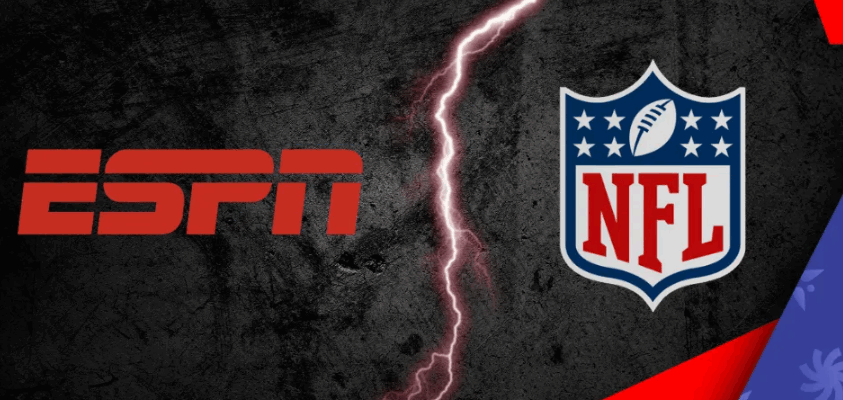The National Football League (NFL) has struck a multi‑billion‑dollar agreement with ESPN that goes far beyond a simple asset sale—it signals a dramatic restructuring of the sports media landscape. The deal, set to be officially announced next week, will transfer several of the NFL’s core media assets to ESPN, including the popular RedZone channel and the long-running NFL Network.
In-Depth: NFL Shifts Multi-Billion Dollar Media Assets to ESPN

A Landmark Deal Reshaping Sports Media
The National Football League (NFL) has struck a multi‑billion‑dollar agreement with ESPN that goes far beyond a simple asset sale—it signals a dramatic restructuring of the sports media landscape. The deal, set to be officially announced next week, will transfer several of the NFL’s core media assets to ESPN, including the popular RedZone channel and the long-running NFL Network.
In exchange, the NFL will receive up to a 10% equity stake in ESPN, valued at approximately $2 billion.
How the Deal Reshapes the Sports Media Market
This is more than just a rights handover. After years of trying to compete with major sports broadcasters by building its own media platforms, the NFL has chosen to sell these in‑house media businesses to one of its most trusted partners.
The assets include:
- NFL Network
- RedZone
- Additional regular‑season game rights
- The league’s Fantasy Football platform
- Plans for new integrated features, such as sports betting
For ESPN, the acquisition comes just ahead of the launch of its direct‑to‑consumer (DTC) streaming service, priced at $29.99 per month. Scheduled to debut within weeks, the service will aim to lure fans away from traditional cable packages by offering a one‑stop app for all ESPN content.
This move is a direct response to the cord‑cutting trend—ESPN’s cable reach has dropped from nearly 98.5 million households in 2013 to about 73 million in 2025.
A Digital‑First Model for Today’s Sports Fans
The new platform will offer live games, highlights, studio programming, and around‑the‑clock coverage, similar to how the SEC Network serves college football fans.
As ESPN President Jimmy Pitaro put it:
“We’re putting all of ESPN’s offerings directly into the hands of fans—and all in one place.”
This underscores ESPN’s ambition to make its brand synonymous with the future of sports streaming.
Financial Stakes and Regulatory Hurdles
The scale of the transaction reflects the power dynamic between the country’s most-watched sports league and one of its most influential broadcasters. By securing a 10% stake in ESPN, the NFL will gain significant influence over its media partner’s direction and success, while ESPN will further embed football into its programming ecosystem.
However, the deal must still secure federal regulatory approval, a process that could take nine to twelve months. Full integration of assets—such as expanding RedZone and boosting streaming content—may not take effect until the 2026 season.
If all goes according to plan, ESPN will broadcast the Super Bowl for the first time in 2027, simulcast with Disney-owned ABC.
Timing and Strategic Rationale
The timing coincides with Disney’s quarterly earnings report. Insiders say this agreement is the result of four years of negotiations. ESPN has long paid around $2.7 billion annually for “Monday Night Football,” but the motivation to bind itself even closer to the NFL is now clearer than ever.
For the NFL, this marks a formal exit from the TV production business, allowing it to focus resources on its brand and IP development, while ESPN assumes responsibility for content creation and distribution.
Impact on RedZone, NFL Network, and Fans
RedZone is one of the crown jewels of this deal. Known for its “whip‑around” coverage showing every scoring opportunity on Sunday afternoons, the channel is beloved by hardcore fans and Fantasy Football players. ESPN plans to fold it into its new streaming service, though details on pricing and packaging remain under wraps.
The collaboration is also expected to integrate NFL Network programming and talent into ESPN’s lineup, potentially creating a unified viewing experience similar to how ESPN covers college football—blurring the lines between networks, shows, and on‑air personalities.
The Future of NFL Viewing
As the media landscape continues to evolve, NFL fans may soon find it easier to watch games without a cable subscription. More live games are expected to migrate to streaming platforms, along with new digital features tailored to online audiences.
The deal still awaits regulatory approval, but it has already drawn intense industry attention. Many are watching to see how it will redefine the future for both ESPN and the NFL.












